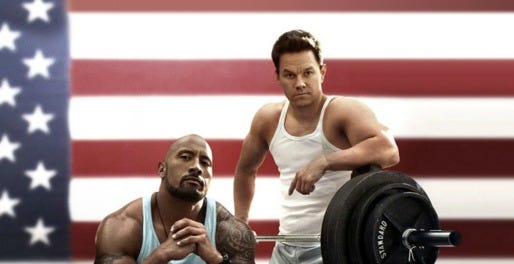Pain & Gain
Michael Bay built a career on excessive violence, excessive sexuality, excessive machismo. He's the standard-bearer for an entire subcategory of action films. Some love to hate him, others love to love him. You know what you're paying for. As the man himself supposedly once said: "I make films for teenage boys, oh, what a crime."
Bay speaks for himself so well that, really, my entire review can be distilled into two sentences:
"Pain & Gain" is a film about three boneheaded men driven to robbery and worse in pursuit of excess. It's the film Bay was born to make.

But let me preview what's in store, maybe entice you a little bit into spending a Friday night at the home theater or on a computer in your bedroom. (Target demographics, for sure.)
Daniel Lugo (Mark Wahlberg) is a man addicted to the variety of self-improvement sold in seminars and supplement stores. He's shallow and stupid but can supposedly squat 500 pounds while you're sitting on your mom's couch eating pizza and drinking Mountain Dew, so who's really living the dream?
There's a problem, though. Lugo can't buy social skills at a store, can't buy a date. Can't buy much of anything, really, after blowing his personal trainer wage on everything else. So he hatches a plan to rob one of his wealthy clients. Accompanying him are his fellow bodybuilders: steroid-addict Doorbal (Anthony Mackie) and born-again Christian Doyle (Dwayne Johnson). Suffice to say, things don't necessarily go as planned. Empty souls have a difficult time being fulfilled by empty desires.
What's shocking about "Pain & Gain," however, is that it's not quite as empty as you'd expect. This is due largely to Johnson's performance as Doyle. He brings comedy and a semblance of moral conflict to the character, a man aware of his failings. Of the three leads. Johnson is given the most to work with, and he manages to build a fairly sympathetic character — which makes his eventual fall actually mean something to the audience beyond its absurdity.
Although the film is more focused on character, it has no shortage of absurd sexuality and violence. But one gets the impression it's done playfully, in the spirit of Bay poking fun at both his detractors and fans. Women are objects to be sought after, and guns are masculine power objects. The Rock walks into a room full of inflatable gay sex toys. He's poking nerves as much as he is tending to an audience that, I think, people like to pretend doesn't exist. Yet for all of this, the main trio of characters are hardly canonized for their lewd behavior. They suffer, and suffer handily, for their shallow view of the world, a shallow view some would say Bay enables with his style.
The dissonance between story and style, in a film where both story and style function as quality units in and of themselves, makes "Pain & Gain" a rather fun film to both watch and contemplate after the fact, even briefly.
Which certainly doesn't fit into the standard definition of a Baysian film, does it?


